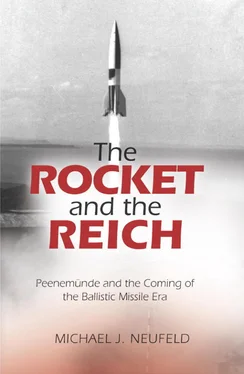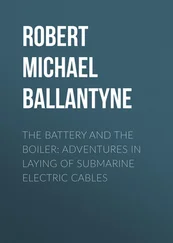Michael Neufeld - The Rocket and the Reich
Здесь есть возможность читать онлайн «Michael Neufeld - The Rocket and the Reich» весь текст электронной книги совершенно бесплатно (целиком полную версию без сокращений). В некоторых случаях можно слушать аудио, скачать через торрент в формате fb2 и присутствует краткое содержание. Город: Washington, Год выпуска: 2013, ISBN: 2013, Издательство: Smithsonian Books, Жанр: История, military_weapon, на английском языке. Описание произведения, (предисловие) а так же отзывы посетителей доступны на портале библиотеки ЛибКат.
- Название:The Rocket and the Reich
- Автор:
- Издательство:Smithsonian Books
- Жанр:
- Год:2013
- Город:Washington
- ISBN:978-1-58834-466-3
- Рейтинг книги:3 / 5. Голосов: 1
-
Избранное:Добавить в избранное
- Отзывы:
-
Ваша оценка:
- 60
- 1
- 2
- 3
- 4
- 5
The Rocket and the Reich: краткое содержание, описание и аннотация
Предлагаем к чтению аннотацию, описание, краткое содержание или предисловие (зависит от того, что написал сам автор книги «The Rocket and the Reich»). Если вы не нашли необходимую информацию о книге — напишите в комментариях, мы постараемся отыскать её.
The Rocket and the Reich — читать онлайн бесплатно полную книгу (весь текст) целиком
Ниже представлен текст книги, разбитый по страницам. Система сохранения места последней прочитанной страницы, позволяет с удобством читать онлайн бесплатно книгу «The Rocket and the Reich», без необходимости каждый раз заново искать на чём Вы остановились. Поставьте закладку, и сможете в любой момент перейти на страницу, на которой закончили чтение.
Интервал:
Закладка:
The Commission’s decision—which may have been taken even before the launches—was to proceed with both weapons at all possible speed. Any skeptics left among the assembled group were drowned out by the collective euphoria of the civilian and military leadership of the Third Reich, which now hoped that secret weapons would reverse the increasingly worrisome course of the war. Approval of both the A-4 and the Fi 103 was justified on the plausible grounds that their advantages and disadvantages were complementary: The cruise missile was cheaper and simpler but had to be launched from fixed catapults vulnerable to air attack, while the ballistic missile would be more accurate but would require components and propellants in short supply. Employed together, they would also have a greater effect on Britain. 51
As the perfunctory character of the “comparison shoot” indicates, the competition was basically a sham. Speer had been pushing Hitler since October 1942 to accept the two programs in parallel, probably with the aim of protecting both the A-4 and his friendly relations with Milch. Because the Third Reich was so riven by competing empires, it was unlikely that the Commission would have had the power to shut down one program in favor of the other anyway, barring a decisive ruling from Hitler. The Long-Range Bombardment Commission appears to have been nothing but a Speer maneuver to patch up interservice relations, neutralize opposition, and secure top priority for A-4 production. As if to confirm that everything had been settled in advance, Speer announced during the May 26 meeting that the A-4 would receive not merely a “DE” rating (at least for the first 1,500 missiles), but the highest possible “DE” rating. To implement that decision, a new numbering system would be introduced similar to that already subdividing the second priority level, “SS.” The A-4 would also get a very high number in the “SS” series. 52
On June 2 the Armaments Ministry issued the necessary order, and a follow-up document from June 11 stated: “The Führer has ordered that the A-4 program rates in priority before all other armaments production.” The next day Dornberger received a promotion to Brigadier General. More dignitaries streamed into Peenemünde, including retired Army Commander-in-Chief von Brauchitsch, Reichsführer-SS Heinrich Himmler, chemical-industry leader Dr. Carl Krauch, and OKW Chief Field Marshal Keitel. The biggest reward, however, came on July 7, when Dornberger and von Braun were suddenly called to East Prussia to meet the Führer. They were accompanied by Ernst Steinhoff, who piloted their He 111 bomber-transport. The fact that the three flew together alarmed Himmler, when he found out. He asked Hitler to forbid a repetition of this incident, lest the leadership of the rocket program be wiped out in a single crash. 53
After keeping the visitors waiting for hours at the Wolfsschanze, the Führer finally appeared, accompanied by Speer, Keitel, and other aides. Dornberger was shocked at the unhealthy, hunched-over appearance of Hitler, whom “I had not seen… since March 1939”—a patently false statement in light of the 1941 visit to the Wolfsschanze. As on that occasion, the Peenemünders began with a propaganda film, in this case one made immediately after the October 3 success. For the first time Hitler saw the impressive images of an A-4 launch. Von Braun narrated the film; Dornberger lectured and showed models of the deployment systems to the visibly fascinated Führer. According to Dornberger, he attempted to persuade Hitler not to construct a launch bunker, but that cannot possibly be true. Organization Todt had been building one for months at Watten (Eperlecques) in the Pas de Calais. It is more likely that he indicated that the mobile system was less vulnerable to Allied air power, but Hitler was so infatuated by the success of the U-boat pens in France and by the thought of gigantic quantities of concrete that he rejected the argument out of hand. Two weeks later the Führer ordered that another bunker be constructed, this time in Normandy, for the bombardment of cities in southwest England and Wales. 54
In Dornberger’s account of the July 7 audience, Hitler went on to demand a 10-ton warhead and a production rate of two thousand missiles a month. When the new general told him that those ideas were impossible, a “strange, fanatical light flared up in Hitler’s eyes. I feared he was going to break out into one of his mad rages. ‘But what I want is annihilation—annihilating effect!’ ” Dornberger relates that he had to keep his composure and find a way to appease the Führer. He allegedly went on to plead with the dictator not to let the Propaganda Ministry spread more rumors of war-winning “wonder weapons”; the A-4 was no such weapon. His account is difficult to believe in view of his many previous attempts to sell the A-4 as decisive. In any case, Hitler emerged from the meeting intoxicated by the missile and told Speer to push its production as fast as possible. The Minister was to modify the decree for the tank program and present it for the Führer’s signature, which Speer did on July 25. Hitler also granted the Minister’s request (originating from Dornberger?) that Wernher von Braun receive the prestigious title of Professor. The Führer was amazed at von Braun’s youth and so impressed by his talent that he made a point of signing the document himself. 55
The Peenemünders naturally felt that they had made a great breakthrough after three and a half years of problems. Dornberger reports that Hitler even made a point of coming to him afterward and saying: “I have had to apologize to only two people in my life. The first is Field Marshal von Brauchitsch. I did not listen to him when he told me again and again how important your research was. The second man is yourself. I never believed that your work would be successful.” 56As dishonest and self-serving as Dornberger’s memoirs are, it is hard to believe that such an amazing statement was not burned indelibly into the general’s memory. But if Hitler did say this, it contradicts many of his statements since August 1941. Such inconsistency was, however, typical of the Führer’s previous behavior regarding the rocket program.
Whatever transpired on July 7, one thing is clear: Dornberger and his followers have greatly overrated the importance of this famous trip to the Wolfsschanze. Speer had already granted the program absolute first priority in early June, missile production had been greatly accelerated since the end of 1942, and A-4 development had been been out of top priority status for only limited periods. Beyond confirming the Führer’s enthusiasm for the A-4 and making it easier for Peenemünde to acquire German skilled workers, the only practical effect of the audience was to fuel a missile mania in the Armaments Ministry that was counterproductive. After the “comparison shoot” Speer’s deputy, Karl Otto Saur, had undergone a conversion experience from A-4 skeptic to missile fanatic. He now wished to put Hitler’s demands for increased production into action. On July 16 he overruled the Degenkolb program and promulgated his own, with the support of the head of the A-4 Special Committee. It projected an output of 900 missiles in October, rising to 1,500 by January, and parts production rising to 1,800 by April 1944! A fourth production site would be created at Degenkolb’s old firm, DEMAG in Berlin-Falkensee. Schubert noted resignedly in his chronicle: “This is the eighth production program in a short period of time.” 57
When Saur issued his decree, the assembly lines at Peenemünde and Friedrichshafen had yet to produce a single A-4, and Wiener Neustadt was months away from being finished. The engine calibration test stands at each site were also far from complete. Thiel estimated that they would not be put into full operation until November at Zeppelin and January at Rax. Von Braun also told Stahlknecht that the facilities at Peenemünde and Friedrichshafen were not built to accommodate 375 engines a month, as the new program specified. There were, of course, many additional difficulties. As Dornberger had told Hitler on July 7, ethanol production (for A-4 fuel) depended on the potato harvest and could not be significantly increased. None of those practical problems deterred Saur, however. At meetings he called in Berlin, starting on July 22, he humiliated industrialists who said his program was infeasible—notably Paul Heylandt, the liquid-oxygen equipment manufacturer who had supported Max Valier a dozen years before. Schubert’s chronicle noted after the meetings: “Some managers will be removed from their posts, and some of those fired will be charged with sabotage.” Missile mania had gotten completely out of hand. 58
Читать дальшеИнтервал:
Закладка:
Похожие книги на «The Rocket and the Reich»
Представляем Вашему вниманию похожие книги на «The Rocket and the Reich» списком для выбора. Мы отобрали схожую по названию и смыслу литературу в надежде предоставить читателям больше вариантов отыскать новые, интересные, ещё непрочитанные произведения.
Обсуждение, отзывы о книге «The Rocket and the Reich» и просто собственные мнения читателей. Оставьте ваши комментарии, напишите, что Вы думаете о произведении, его смысле или главных героях. Укажите что конкретно понравилось, а что нет, и почему Вы так считаете.












